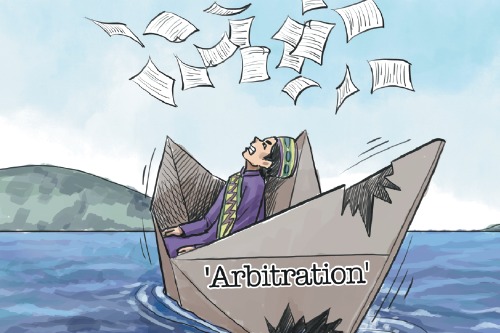Pompeo's South China Sea statement mirrors abuse of international law

US Secretary of State Mike Pompeo issued a so-called South China Sea statement on July 13, in which he declared that China's claims to offshore resources across most of the South China Sea are completely unlawful. Pompeo's statement, lacking a solid legal basis, is intended to achieve expected political gains in the region, rather than uphold international law. As is already well known, the United States is neither a state party to the 1982 United Nations Convention on the Law of the Sea (UNCLOS) nor party to the dispute in the region. Nevertheless, the United States enthusiastically provides irresponsible comments on the application of UNCLOS as well as dispute resolution in the region, and frequently, under the guise of upholding international law, conducts freedom of navigation operations for military or other hostile purposes in the region, thus essentially practicing "might makes right". International law was and is being abused as a tool to ensure US hegemony over the region. The danger of Pompeo's statement lies not only in aggravating tensions in the region but also in casting a shadow over international rule of law.
First, Pompeo's statement attempts to replace international law with some new "rules-based international order", which is a dangerous move for upholding UN-led "international order based on rule of law". In his statement, deployment of the term "rules-based international order" is essentially intended to uphold power politics in the region, but rather international law. The rule of law is a concept at the very heart of the UN's mission. In the 2012 UN Declaration on the rule of law at national and international levels, "an international order based on the rule of law" is regarded as "the indispensable foundations for a more peaceful, prosperous and just world". The formulation "rules-based international order", however, is a rhetorical shift from the UN concept, and such a shift is helpful in concealing the US's dark record of violations of international law. As a much broader term than international law, "rules-based international order" could be used as a tool for political expediency by which the United States could arbitrarily define what is international law and what is not, and could freely choose laws and rules from which it would benefit best. It is by way of establishing and applying the double standard that the United States abuses international law in the region.
Second, Pompeo's statement undermines the balance between the rights and obligations of States, which is not in line with the development of contemporary international law. Pompeo's statement replaces the legal term, "freedom of the high seas", from UNCLOS with a much broader term, "freedom of the seas", which was used by Grotius in the 17th century. The rebirth of the historical term, "freedom of the seas", having no place in the 21st century, on closer examination, implies excessive maritime claim based on a predatory world view, as well as ambition for building a world maritime empire. From the legal perspective, UNCLOS advocates a balance between the rights and obligations of States in the various maritime zones, while Pompeo's statement, insisting on blind adherence to the freedom of the seas, undermines such balance, thus not only enhancing the risk of conflict in the region but also creating obstacles to the development of contemporary international law. For fear of the implementation of due regard obligations under UNCLOS, the United States has to date not become a state party to UNCLOS. It is by way of taking negative attitudes towards treaty obligations and misinterpreting principles of general international law that the United States abuses international law in the region.
Third, Pompeo's statement, based on knowingly false and misleading information, attempts to sow discord and provoke conflict in the region, which shakes the very foundation of international law. In his statement, the positive remarks made by Chinese official around peaceful dispute resolution in the region through negotiations is taken out of context in bad faith, contrary to fundamental principle of international law. Actually, good faith is both a general principle of international law and a legal principle under UNCLOS, overarching an entire legal order. "Good faith is a fundamental principle of international law", as former ICJ judge Mohammed Bedjaoui puts it, "without which all international law would collapse." In the context of competing national interests, the good faith principle is helpful in mediating the effects of states' rights and in achieving acceptable results in the dispute resolution process. Pompeo's absurd statement, however, provokes inter-state conflict and thrives on chaos in the region, and it has no interest in peaceful settlement of international disputes, a fundamental principle of international law as formulated in the UN Charter. It is by way of despising the good faith principle and peaceful principle that the United States abuses international law in the region.
Contrary to Pompeo's absurd allegations, it is under international law that China's sovereignty over the Nanhai Zhudao and its adjacent waters, as well as sovereign rights and jurisdiction over its relevant maritime zone, are well established. Abundant historical evidence shows that China is the first country to have discovered, named, explored and exploited Nanhai Zhudao and its relevant waters, and the first to have continuously, peacefully and effectively exercised sovereignty and jurisdiction over them. The core of the South China Sea issue lies in territorial sovereignty, which is governed by the customary law of territory, rather than UNCLOS. Falling within the scope of the matters not regulated by UNCLOS, China's historic rights in the South China Sea are well established under international law.
The South China Sea issue is highly complex and sensitive in nature, and its satisfactory resolution will test the political wisdom of the claimants. Dialogue and consultation is the only ways to resolve the dispute in the region, and cooperation, rather than confrontation, is the only way forward to peace, security and stability in the region. The Chinese people, non-aggressive in nature, love peace, and China has no interest in building a so-called maritime empire in the region. As a country outside the region, the United States has no legal grounds to get involved in the South China Sea issue. The United States should stop taking unilateral actions to worsen the situation in the region, and stop abusing international law motivated by narrow self-interest.
Luo Gang is associate research fellow at the China Institute for Marine Affairs.


































